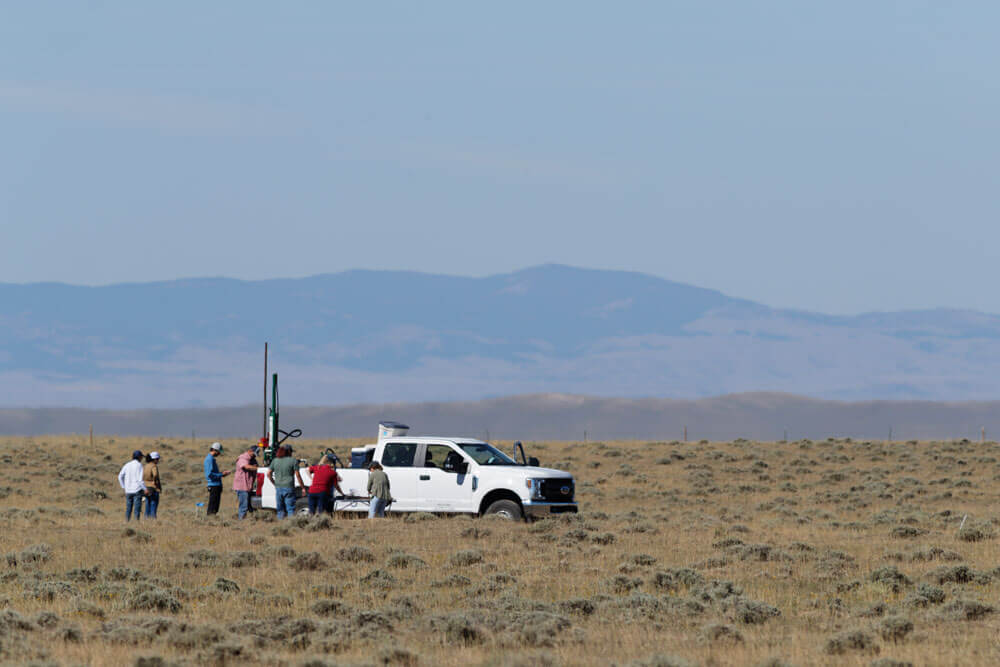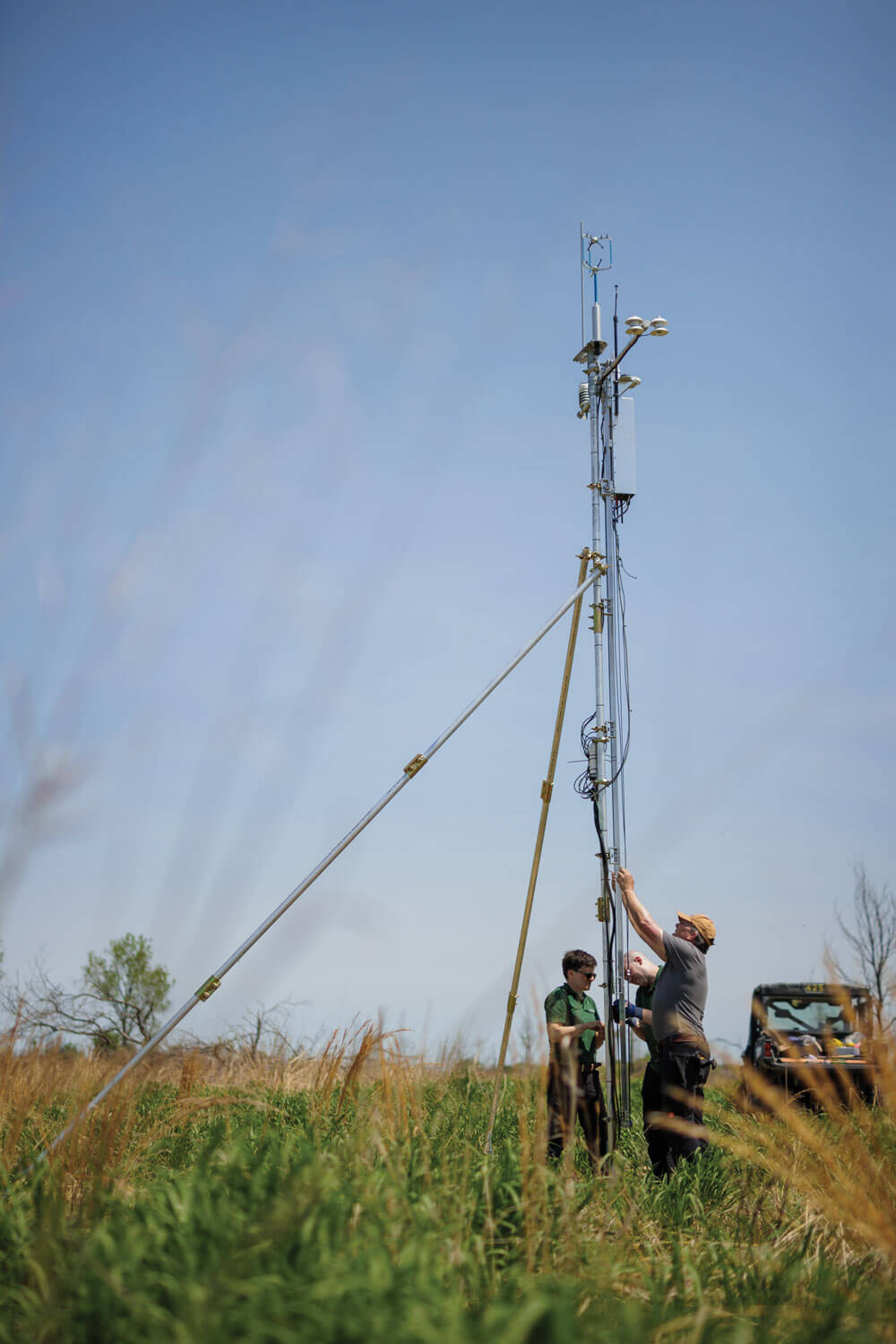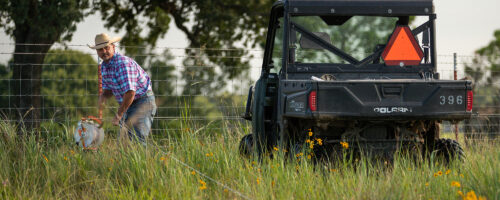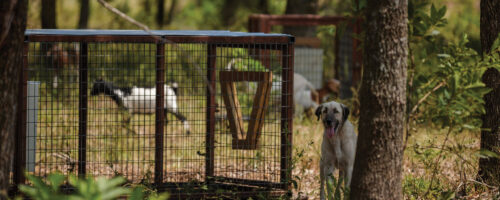The countryside of south-east Wyoming looks like the surface of the moon.
Arid plains stretch uninterrupted to the plateaus that ridge the horizon. There are no trees, fence lines or anything much taller than a boot to obscure the view. The entirety of the visible surface is dotted with sagebrush and herbaceous flowering plants that, when repeated for endless miles, mirror the pockmarked lunar surface. This is where the Great Plains truly earns its moniker.
In late August, more than a dozen researchers and staff — from Noble Research Institute, the University of Wyoming, Colorado State University, Michigan State University, Texas A&M University, USDA/ARS-Beltsville and Quanterra Systems — gathered to take hundreds of soil cores, measure water infiltration and build flux towers.

This is the third such stop on this interorganizational band’s tour. They held two similar sampling weeks earlier in the year: one at Noble’s ranches in Oklahoma and one in Michigan. The three sessions serve as the initial leg of the Metrics, Management, and Monitoring (3M) project.
The $19.2 million research initiative aims to understand how a farmer or rancher’s grazing management decisions impact soil health and, in turn, how soil health can positively impact land and producer well-being. 3M is one of the most robust investigations of our grazing lands across time and space, diversity of landscapes and management approaches.
So why does any of this matter to you?
This is not research to merely satisfy the curious minds of scientists. This is an army of like-minded soldiers marching for your cause.
At Noble, research is our middle name because we understand that ranchers like you are actively managing your business through a series of interconnected challenges (increasing costs, supply chain blockages, regulation, generational transfer, climate variability and debt) that spur a complex series of questions.
You are asking questions, and we are doing more than listening. We’re mobilizing our research to answer the hard questions: How do I improve soil health and build a strong-
er bottom line? How do I leave this land to my children? How do I navigate the challenges of modern agriculture? Is there a different way beyond what I’ve always done? How do I begin such a transition?

We conduct ranch-scale research to generate a deep well of knowledge. Then we synthesize that information into usable educational products. We deliver these products to you so that you can make informed decisions and build a multi-generation business. In short, research at Noble has the specific end goal of education.
What starts as soil samples, water measurements and production data on research sites across the country evolves into applicable knowledge that helps inform your ranch operation in your geography. Transformation takes information, and information requires investigation.
Rest assured, this is not research to merely satisfy the curious minds of scientists. This is an army of like-minded soldiers marching for your cause. We are producers first and foremost, devoted to developing and sharing outcomes to benefit an entire industry. We will sort through the spaghetti noodles of interwoven issues and find answers that propel our collective journey deeper into the application of the soil health principles.
Why soil health? Because healthy soil makes the land more resilient. Working with nature reduces the need for input costs and galvanizes your bottom line. Healthy soil creates a thriving ecosystem, productive land and a legacy that ultimately spreads from your ranch to the surrounding communities, benefiting us all.
You’re going to great lengths to steward your land, ask important questions and learn. We’re committed to finding usable answers, being a faithful friend and a helpful guide.
Heck, we’ve already been to the moon.
Blessings on your journey,
J. Adam Calaway
Connecting Grazing and Soil Health
The Foundation for Food and Agriculture Research awarded Noble Research Institute a $9 million grant to lead critical research that is focused on understanding how a farmer or rancher’s grazing management decisions impact soil health and producer well-being. Noble Research Institute is providing $7.5 million to the Metrics, Management, and Monitoring project, with additional financial contributions from Greenacres Foundation, The Jones Family Foundation and ButcherBox.
Read more about the project, the questions being posed by ranchers, and how Noble and its collaborators are seeking to answer them in our cover story, “The Whys, Wills and What Ifs of Regenerative Ranching.”



Comment